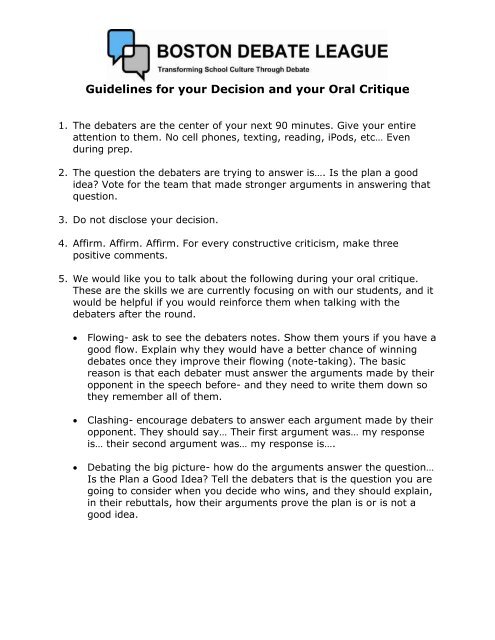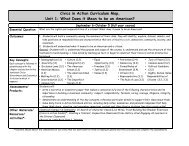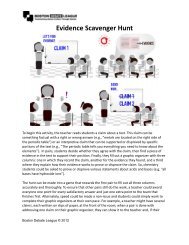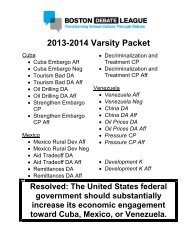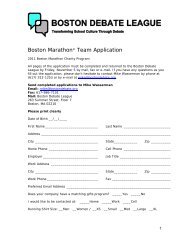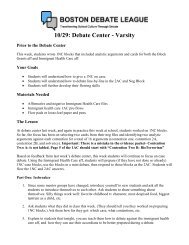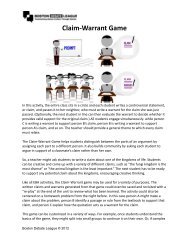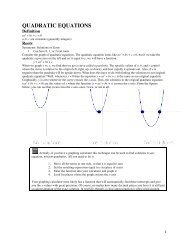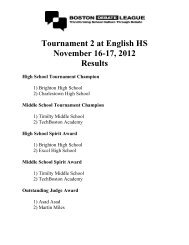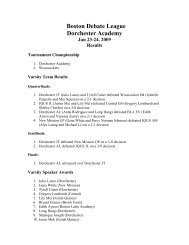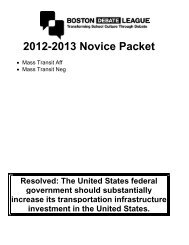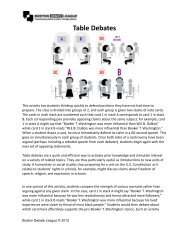Guidelines for your Decision and your Oral Critique - Boston Debate ...
Guidelines for your Decision and your Oral Critique - Boston Debate ...
Guidelines for your Decision and your Oral Critique - Boston Debate ...
Create successful ePaper yourself
Turn your PDF publications into a flip-book with our unique Google optimized e-Paper software.
<strong>Guidelines</strong> <strong>for</strong> <strong>your</strong> <strong>Decision</strong> <strong>and</strong> <strong>your</strong> <strong>Oral</strong> <strong>Critique</strong><br />
1. The debaters are the center of <strong>your</strong> next 90 minutes. Give <strong>your</strong> entire<br />
attention to them. No cell phones, texting, reading, iPods, etc… Even<br />
during prep.<br />
2. The question the debaters are trying to answer is…. Is the plan a good<br />
idea Vote <strong>for</strong> the team that made stronger arguments in answering that<br />
question.<br />
3. Do not disclose <strong>your</strong> decision.<br />
4. Affirm. Affirm. Affirm. For every constructive criticism, make three<br />
positive comments.<br />
5. We would like you to talk about the following during <strong>your</strong> oral critique.<br />
These are the skills we are currently focusing on with our students, <strong>and</strong> it<br />
would be helpful if you would rein<strong>for</strong>ce them when talking with the<br />
debaters after the round.<br />
<br />
<br />
<br />
Flowing- ask to see the debaters notes. Show them <strong>your</strong>s if you have a<br />
good flow. Explain why they would have a better chance of winning<br />
debates once they improve their flowing (note-taking). The basic<br />
reason is that each debater must answer the arguments made by their<br />
opponent in the speech be<strong>for</strong>e- <strong>and</strong> they need to write them down so<br />
they remember all of them.<br />
Clashing- encourage debaters to answer each argument made by their<br />
opponent. They should say… Their first argument was… my response<br />
is… their second argument was… my response is….<br />
Debating the big picture- how do the arguments answer the question…<br />
Is the Plan a Good Idea Tell the debaters that is the question you are<br />
going to consider when you decide who wins, <strong>and</strong> they should explain,<br />
in their rebuttals, how their arguments prove the plan is or is not a<br />
good idea.
Some Specific suggestions you can talk about in <strong>your</strong> oral<br />
critique after the round….<br />
For JV<br />
The 1AC should be flowed on 3<br />
sheets of paper<br />
The 1NC should make 4<br />
arguments against each part of<br />
the aff (the two problems <strong>and</strong> the<br />
solution)- total of 12 arguments<br />
<br />
<br />
Two of those arguments should be<br />
analytical <strong>and</strong> two should be<br />
evidenced<br />
The rest of the debate should be<br />
based off of those 1NC numbersstudents<br />
should clash <strong>and</strong> refer to<br />
arguments by number<br />
For Varsity<br />
Same as JV except…<br />
<br />
1AC should be flowed on 4 sheets<br />
of paper<br />
The 1NC should have 16<br />
arguments- still 2 analytical <strong>and</strong><br />
two evidenced arguments against<br />
each part of the aff<br />
<br />
<br />
The 1NC should also read one<br />
disadvantage<br />
Please discourage talking too fast<br />
<br />
The end question students should<br />
be answering at the end of the<br />
debate is…<br />
“Is the plan a good idea”


